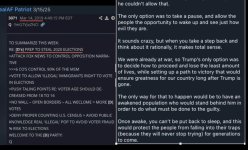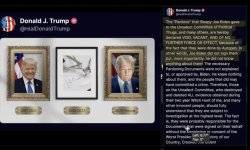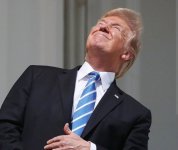D
Navigation
Install the app
How to install the app on iOS
Follow along with the video below to see how to install our site as a web app on your home screen.
Note: This feature may not be available in some browsers.
More options
You are using an out of date browser. It may not display this or other websites correctly.
You should upgrade or use an alternative browser.
You should upgrade or use an alternative browser.
Trump "revokes" pardons made by President Joe Biden
- Thread starter RobDownSouth
- Start date
He couldn't tell you what he had for breakfast.The fact is, the President is proceeding with planned precision and knowing exactly what he's doing and what the goals are.
Bn2f
Literotica Guru
- Joined
- Nov 11, 2020
- Posts
- 10,668
Your brackets filled out?
Who ya got in the final four?
Glad ya asked! It's moving right along! As is MANYother states! Like Ive said all aong, the biggest sting opperation in the history of the world! He caught them ALL! BQQM! MARCH MADNESS! And the games haven't even started yet!I’ll put you down as still believing what trump says
How’s that Arizona voter fraud investigation going?

colddiesel
Literotica Guru
- Joined
- Aug 22, 2006
- Posts
- 5,745
Now this gem is worth saving to be quoted in future!The fact is, the President is proceeding with planned precision and knowing exactly what he's doing and what the goals are.

But there is absolutely nothing of any consequence in this latest distraction from Trump
HisArpy
Loose canon extraordinair
- Joined
- Jul 30, 2016
- Posts
- 43,760
There is photographic proof of Biden signing many of the documents that The Heritage Foundation is claiming were signed by autopen.
I'm sure you can find and post those images...
ll74
Your Best Friend
- Joined
- Aug 22, 2013
- Posts
- 64,634
HisArpy
Loose canon extraordinair
- Joined
- Jul 30, 2016
- Posts
- 43,760
I say we get HisSharpy to reverse all the laws that were signed by Presidents that Rightguide & LLCool74 say are crazy.
Sorry, not interested. Please withdraw my name from the nomination pool.
HisArpy
Loose canon extraordinair
- Joined
- Jul 30, 2016
- Posts
- 43,760
so... threats of annexation are illegal according to article one of the UN charter. Trump has been making endless threats of annexation. What he is doing is attempting to undermine our sovereignity. It is illegal. The only way Canada will become a part of the USA is if you invade us. Which would be akin to what Putin did to the Ukraine. Do you see?
Since when is the US controlled by the UN and the US Constitution overruled by UN proclamations?
HisArpy
Loose canon extraordinair
- Joined
- Jul 30, 2016
- Posts
- 43,760
I’ll put you down as still believing what trump says
As they say, the proof is in the pudding. So far dessert has been delicious. You should try some instead of the swill you keep vomiting back up.
idiotI'm sure you can find and post those images...
https://www.whro.org/virginia-gover...eve-in-redemption-virginia-house-speaker-says
HisArpy
Loose canon extraordinair
- Joined
- Jul 30, 2016
- Posts
- 43,760
Well lookee here... someone finally figured out how to googie woogie.
Now if only we could get you to stop demanding other people to include links along with their posts...
Well if you "figured" out google, you wouldn't look half as stupid, but the downside is I'd have one less poster here to laugh at....Well lookee here... someone finally figured out how to googie woogie.
Rightguide
Prof Triggernometry
- Joined
- Feb 7, 2017
- Posts
- 68,558
I attack the left because they have no sense, productive purpose, social sanity, or American spirit.So, let me get this straight. You insult the left by saying we have no sense of humour (about a subject that isn’t, at its core, funny at ALL.) But then when BrightShinyGirl posts a funny, leftist clip showing that Lefty’s have a sense of humour, you then respond seriously, thus (again) missing the point entirely? You sir, are a douche-nozzle.
Rightguide
Prof Triggernometry
- Joined
- Feb 7, 2017
- Posts
- 68,558
That's juvenile bullshit. You're describing Joe Biden.He couldn't tell you what he had for breakfast.
DeluxAuto
AntiSocial Extrovert
- Joined
- Dec 16, 2010
- Posts
- 21,766
You're an idiot, racist and an old white guy....looking to turn the clock back 40-60 years or so, when white guys kinda ruled the USA.I attack the left because
RobDownSouth
BoycotDivestSanctio
- Joined
- Apr 13, 2002
- Posts
- 78,314
Nonsense, my friend. Even if the Derpmeister could somehow master Google searches, we'd still have an inordinate amount of laughs at his expense over his tortured 'well ackshually' re-interpretations.Well if you "figured" out google, you wouldn't look half as stupid, but the downside is I'd have one less poster here to laugh at....
SgtSpiderMan
Literotica Guru
- Joined
- Jun 3, 2003
- Posts
- 28,208
Trump and all of us know what he had for breakfast, fast food.He couldn't tell you what he had for breakfast.
Rightguide
Prof Triggernometry
- Joined
- Feb 7, 2017
- Posts
- 68,558
The courts will have to determine whether an official document that can only be signed by the President has, in fact, been personally signed by him—or instead by someone or something else, such as an Autopen.The "autopen" nontroversy is a canard.
The President's power to pardon is "near-absolute'. (Obviously he/she cannot pardon an impeachment).
Anything said to the contrary is smoke 'n mirrors, courtesy of The Heritage Foundation.
Notably, under the Constitution, only the President has the authority to sign a legislative bill before it becomes law. Article I, Section 7, Clause 2 states:
"Every Bill which shall have passed the House of Representatives and the Senate, shall, before it become a Law, be presented to the President of the United States; If he approves he shall sign it, but if not he shall return it, with his Objections to that House in which it shall have originated, who shall enter the Objections at large on their Journal, and proceed to reconsider it."
The text explicitly says "he shall sign it." It does not say an Autopen, a proxy, or any other person. The language of the founding generation strongly suggests that a bill only becomes law after the President himself has signed it. By extension, it can be argued that other official documents requiring the President’s signature must also be personally signed to be valid.
This is not a mere technicality, it is the only way to ensure that the President has exercised his constitutional duty with knowledge and intent. If an underling can sign in his place, whether by hand or by machine, it raises serious concerns about the usurpation of presidential authority and the integrity of the lawmaking process.
ll74
Your Best Friend
- Joined
- Aug 22, 2013
- Posts
- 64,634
There is no challenge that can or will be made to the courts on this.The courts will have to determine whether an official document that can only be signed by the President has, in fact, been personally signed by him—or instead by someone or something else, such as an Autopen.
Notably, under the Constitution, only the President has the authority to sign a legislative bill before it becomes law. Article I, Section 7, Clause 2 states:
The text explicitly says "he shall sign it." It does not say an Autopen, a proxy, or any other person. The language of the founding generation strongly suggests that a bill only becomes law after the President himself has signed it. By extension, it can be argued that other official documents requiring the President’s signature must also be personally signed to be valid.
This is not a mere technicality, it is the only way to ensure that the President has exercised his constitutional duty with knowledge and intent. If an underling can sign in his place, whether by hand or by machine, it raises serious concerns about the usurpation of presidential authority and the integrity of the lawmaking process.
Rotadom
Satan's Plaything
- Joined
- Oct 14, 2017
- Posts
- 11,510
Trump’s Latest Word Salad Isn’t Just Wrong. It’s Insane
The president’s attempts to undo Joe Biden’s pardons lean on the autopen and crank theories of the Constitution.
Teaching Constitutional Law in the Pacific Northwest over three decades, I made the acquaintance of many buckaroos who would wander down from the hills and explain to me that the Fourteenth Amendment isn’t a real Amendment; that Federal Reserve notes aren’t real money; and that federal courts aren’t real courts (because in most courtrooms there’s a fringe on the American flag).
These are soul-numbing—and, in their way, heart-rending—displays of gullibility by interlocutors, often sincere and intelligent, who choose to live in a headspace where the law is Harry Potter-style magic rather than the complex social and political institutions in which lawyers and judges actually work. What is even more soul-numbing—and significantly less intelligent—is seeing this level of dysfunction displayed by the chief executive.
Yesterday, mostly out of the blue, the American people were treated to just this sight. Donald Trump suddenly decided that federal pardons aren’t real pardons because a presidential signature wasn’t an actual signature.
Here is Trump’s post on his proprietary social medium site:
The ‘Pardons’ that Sleepy Joe Biden gave to the Unselect committee of Political Thugs, and many others, are hereby declared VOID, VACANT, AND OF NO FURTHER FORCE OR EFFECT, because of the fact that they were done by Autopen. In other words, Joe Biden did not sign them but, more importantly, he did not know anything about them!
Thank you, Mr. President, but, well . . . no.
Here is a small sampler of what is wrong with Trump’s latest paroxysm. First, Trump doesn’t know that Biden used an autopen. The “report” by the magicians at the Heritage Foundation’s “Oversight Project” is based on the fact that signatures on online documents signed by Biden bear identical signatures. This, of course, must mean that the originals were signed by Autopen.
Except, um, no: even before Trump’s tantrum, Snopes.com had explained that this “evidence” was not evidence at all:
the National Archives, which runs the Federal Register, said in an emailed statement that official documents published in the Federal Register use a copy of the president’s signature that “comes from one graphic file.” “At the beginning of each administration, the White House sends a sample of the President’s signature to the Office of the Federal Register, which uses it to create the graphic image for all Presidential Documents published in the Federal Register,” communications staff at the National Archives wrote. As the Federal Register’s digitized documents do not represent what the signature looks like on the original documents, the Oversight Project’s claim lacks credibility.
Beyond that, there is no principle of law invalidating a pardon—or any presidential document—because an autopen signs it. The autopen, invented by Thomas Jefferson (for those scoring at home, our third President), is as American as the Thanksgiving turkey pardon. By law, a presidential autopen signature on a document is as valid as one written by hand. A formal opinion from the Department of Justice’s Office of Legal Counsel delivered in July 2005, “Whether the President May Sign a Bill by Directing That His Signature Be Affixed to It,” clarifies this. After an extensive review of the history of presidential signatures and the meaning of the term in the context of the Constitution, the opinion states, “We conclude that the President need not personally perform the physical act of affixing his signature to a bill to sign it within the meaning of Article I, Section 7.”
Here is a critical fact broken down into particles small enough to be digested even by the Oversight Project: Even if you think the OLC opinion is wrong, it is still the law. You don’t get to begin invalidating documents by pretending it does not exist.
The president’s attempts to undo Joe Biden’s pardons lean on the autopen and crank theories of the Constitution.
Teaching Constitutional Law in the Pacific Northwest over three decades, I made the acquaintance of many buckaroos who would wander down from the hills and explain to me that the Fourteenth Amendment isn’t a real Amendment; that Federal Reserve notes aren’t real money; and that federal courts aren’t real courts (because in most courtrooms there’s a fringe on the American flag).
These are soul-numbing—and, in their way, heart-rending—displays of gullibility by interlocutors, often sincere and intelligent, who choose to live in a headspace where the law is Harry Potter-style magic rather than the complex social and political institutions in which lawyers and judges actually work. What is even more soul-numbing—and significantly less intelligent—is seeing this level of dysfunction displayed by the chief executive.
Yesterday, mostly out of the blue, the American people were treated to just this sight. Donald Trump suddenly decided that federal pardons aren’t real pardons because a presidential signature wasn’t an actual signature.
Here is Trump’s post on his proprietary social medium site:
The ‘Pardons’ that Sleepy Joe Biden gave to the Unselect committee of Political Thugs, and many others, are hereby declared VOID, VACANT, AND OF NO FURTHER FORCE OR EFFECT, because of the fact that they were done by Autopen. In other words, Joe Biden did not sign them but, more importantly, he did not know anything about them!
Thank you, Mr. President, but, well . . . no.
Here is a small sampler of what is wrong with Trump’s latest paroxysm. First, Trump doesn’t know that Biden used an autopen. The “report” by the magicians at the Heritage Foundation’s “Oversight Project” is based on the fact that signatures on online documents signed by Biden bear identical signatures. This, of course, must mean that the originals were signed by Autopen.
Except, um, no: even before Trump’s tantrum, Snopes.com had explained that this “evidence” was not evidence at all:
the National Archives, which runs the Federal Register, said in an emailed statement that official documents published in the Federal Register use a copy of the president’s signature that “comes from one graphic file.” “At the beginning of each administration, the White House sends a sample of the President’s signature to the Office of the Federal Register, which uses it to create the graphic image for all Presidential Documents published in the Federal Register,” communications staff at the National Archives wrote. As the Federal Register’s digitized documents do not represent what the signature looks like on the original documents, the Oversight Project’s claim lacks credibility.
Beyond that, there is no principle of law invalidating a pardon—or any presidential document—because an autopen signs it. The autopen, invented by Thomas Jefferson (for those scoring at home, our third President), is as American as the Thanksgiving turkey pardon. By law, a presidential autopen signature on a document is as valid as one written by hand. A formal opinion from the Department of Justice’s Office of Legal Counsel delivered in July 2005, “Whether the President May Sign a Bill by Directing That His Signature Be Affixed to It,” clarifies this. After an extensive review of the history of presidential signatures and the meaning of the term in the context of the Constitution, the opinion states, “We conclude that the President need not personally perform the physical act of affixing his signature to a bill to sign it within the meaning of Article I, Section 7.”
Here is a critical fact broken down into particles small enough to be digested even by the Oversight Project: Even if you think the OLC opinion is wrong, it is still the law. You don’t get to begin invalidating documents by pretending it does not exist.
Lance_Castro
Gynephiliac
- Joined
- Oct 5, 2024
- Posts
- 5,033
President Nutbar of the United States of Arseholes.
He looks good on you!
Lol
He looks good on you!
Lol
Similar threads
- Replies
- 7
- Views
- 135
- Replies
- 34
- Views
- 925
- Replies
- 17
- Views
- 447
Share:

